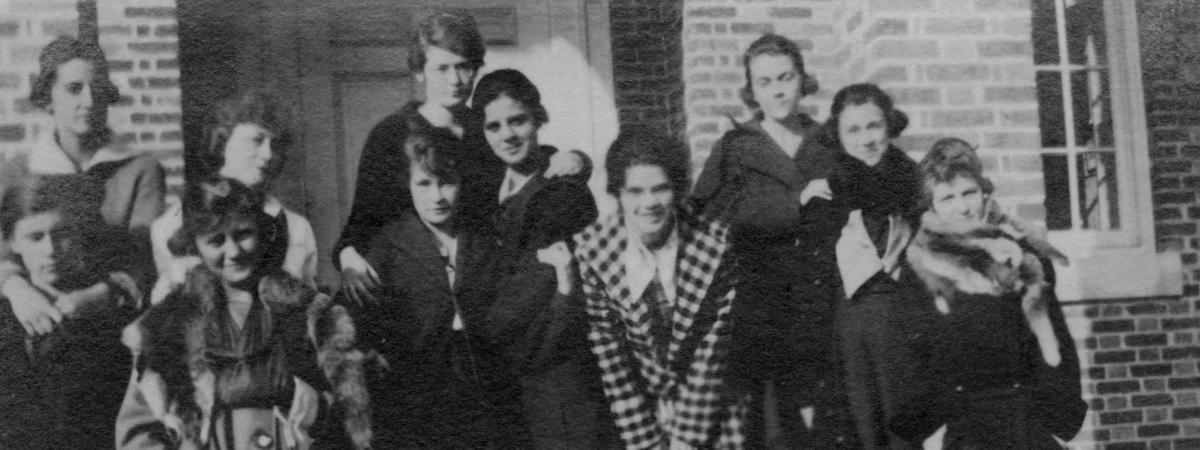
History
History
Norfolk College of William & Mary
The Norfolk Division of William & Mary was established in 1930. Its name was changed in 1960 to Norfolk College of William & Mary. The institution became independent from the College of William & Mary in 1962 and the name was changed at that time to Old Dominion College. In 1969 the…Nottoway Quarter
The Nottoway Quarter or Plantation was a tobacco plantation acquired by William & Mary in 1718 when the General Assembly presented the College with £1000, of which £100 was used to buy 2119 acres "on both sides of Nottoway River" at the then intersection of Prince George, Surry, and Brunswick…Pirates
Pirates captured by the British in Virginia and imprisoned in England provided funds important to William & Mary when it was founded. Lionel Wafer, surgeon; Edward Davis, captain of the Batchelors Delight; and John Hingson, a shipmate on the Batchelors Delight were together fined 300 pounds,…Race Relations in Williamsburg
Accounts of several race related incidents in Williamsburg from the early 1900s.Religious Bodies in Williamsburg
Religion played a central role in the lives of Williamsburg's residents of all colors. Nearly everyone belonged to one of the city's Protestant churches, which were largely segregated. Church services, prayer meetings, and Sunday school attendance were common activities. Summertime brought church…Relocation of the College
There have been five times in its history when William & Mary faced a future bleak enough that attempts were made to relocate the institution. The first attempt occurred in 1792 when the College had lost most of its funding because of the Revolutionary War, and due to the removal of the Capitol…Royal Charter
William & Mary President James Blair brought both English and Latin versions of the twelve page Royal Charter establishing the college with him from the Court of William and Mary at Kensington Palace. This original copy of the charter establishing William & Mary in Virginia was apparently…Student Protests and Rallies
Protests by students at William & Mary have included the following (note this list is incomplete):Sundial
The William & Mary sundial was probably made in London during the seventeenth century or early eighteenth century. Scientific measurements of how lines on the dial by Dr. George W. Crawford, Professor of Physics Emeritus, prove it was engraved for use in the vicinity of Williamsburg.The College and Slavery
William & Mary benefited from enslaved labor from its inception in 1693 until the Emancipation Proclamation made slavery illegal in the Confederate states in 1863. Recently, universities have more closely examined their historic connections to slavery.Transfer to the Faculty In Virginia
The Transfer to the Faculty in Virginia, 27 February 1729, transferred the Royal Charter and the ruling authority of William & Mary from the original founders named in the Charter and gave it to the President and masters of the College.University Nomenclature
The nation's second oldest institution of higher learning, William & Mary was named for its royal benefactors, King William III and Queen Mary II of England who created the school by royal charter in 1693. The usage and logo guidelines below were written to assist members of the media when…Virginia Associated Research Campus
The Virginia Associated Research Campus (VARC), was a former division of William & Mary from the 1960s to the 1980s.Voting
After the Civil War, African American men gained the right to vote. By the late 1800s, they formed a large percentage of the voters in Williamsburg and James City County, strongly supporting the Republican Party. Several won election to public office, with Daniel Norton and the Rev. John Dawson…W&M Historical Highlights
This is a working chronological list of William & Mary Historical Highlights prepared for use by staff of the Swem Library's Special Collections Research Center. There is of course much more to the history of William & Mary than the dates and vignettes listed here.William & Mary
William & Mary in Virginia is the second-oldest college in the United States (after Harvard), and the first university. William & Mary was founded in 1693 by virtue of a Royal Charter issued by King William III and Queen Mary II of England. Named in their honor, William & Mary is a…William & Mary Hymn
Beneath thy trees, within thy halls, We come, dear school, with praise for thee, To pledge ourselves, whate'er befalls-- To pledge unfailing loyalty. Our hearts are with thee, dear William & Mary, However far we stray. Our noble college, hear us now-- Thy children sing to thee today! Dear…Williamsburg Education
Over the years, numerous private schools existed in Williamsburg. The College of William & Mary had long sponsored a grammar school for white boys and in 1870 built a school on the site of the Governor's Palace. The "Mattey School" honored Matthew Whaley, the son of Mary Whaley. Her 1742…World War I
Despite the brevity of U.S. participation, the War had a deep impact on Williamsburg. Only a few residents and William and Mary alumni lost their lives, but hundreds of men registered for the draft and others enlisted.World War II
Related to the College of William of Mary The College of William & Mary enabled students to finish their education quicker during the war in part via a summer school program. A Navy Chaplains school was operated on campus during the war.
